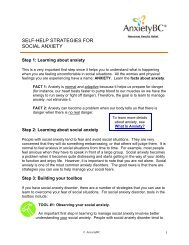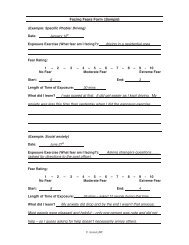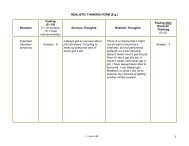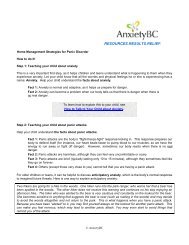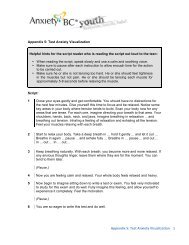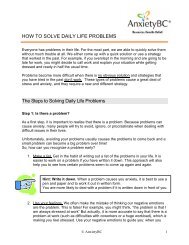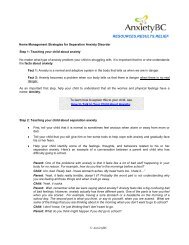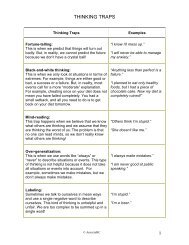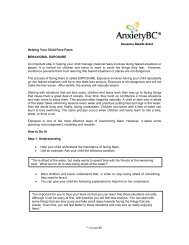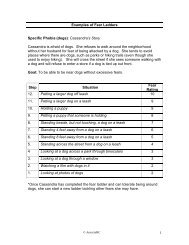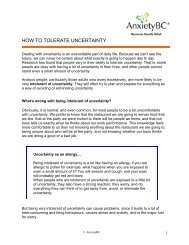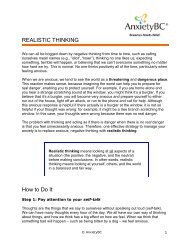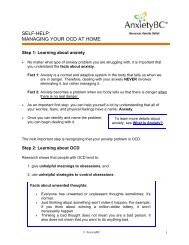Home Management Strategies for OCD - Anxiety BC
Home Management Strategies for OCD - Anxiety BC
Home Management Strategies for OCD - Anxiety BC
Create successful ePaper yourself
Turn your PDF publications into a flip-book with our unique Google optimized e-Paper software.
or she is feeling anxious. The STOP plan can help your child to STOP these unhealthy thoughts, and<br />
rethink whether or not they are in fact true. For more in<strong>for</strong>mation on the STOP plan <strong>for</strong> younger children,<br />
see Healthy Thinking <strong>for</strong> Young Children. To help teens think more realistically, see Realistic<br />
Thinking <strong>for</strong> Teens.<br />
Tool #8: In<strong>for</strong>mation about Obsessions<br />
Some children or teens have obsessions that involve very upsetting, scary, or gross thoughts. For<br />
example, some children may have unwanted thoughts like “What if I pushed somebody in front of a car?”<br />
or “I thought about my mom getting hit by a car today; that must mean that it will happen!” A good way to<br />
help your child deal with these types of thoughts it to talk to them about obsessions. Here are some facts<br />
about obsessions:<br />
Fact #1: Everybody has unwanted or unpleasant thoughts sometimes. It is normal.<br />
Fact #2: Just thinking about something won’t make it happen. For example, if you think about<br />
breaking your leg, it won’t necessarily happen.<br />
Fact #3: Thinking a bad thought does not mean you are a bad person. It also does not mean you<br />
want to do anything bad. Obsessions are just “garbage of the mind.”<br />
Fact #4: The best way to boss back these thoughts is to ignore them. If you don’t pay attention to<br />
the thought, it will go away on its own. If you try to fight it or push it out of your head, it will keep<br />
coming back!<br />
Step 4: Building on Bravery<br />
One final tip:<br />
Although all of these tools can be very effective in helping you to manage your<br />
child’s <strong>OCD</strong>, sometimes it is not enough. Sometimes children have very severe<br />
<strong>OCD</strong>, and despite all your best ef<strong>for</strong>ts, they may still be struggling daily. If this is<br />
the case with your child, it is a good idea to obtain some professional help in<br />
dealing with <strong>OCD</strong>, either through a consult with your GP, a psychiatrist, or a<br />
child psychologist/mental health worker.<br />
Your child's progress comes from hard work. If you are noticing improvements, both you and your child<br />
deserve lots of credit! Learning to overcome anxiety is like exercise – your child needs to "keep in shape"<br />
and practice his or her skills regularly, and make them a habit. This is true even after your child is feeling<br />
better and has reached his or her goals.<br />
Don't be discouraged if your child has lapses and returns to old behaviors every once in a while,<br />
especially during stressful times or transitions. This is normal, and just means that one or two tools in the<br />
toolbox need to be practiced again. Remember, coping with anxiety is a lifelong process.<br />
Hint: Occasionally remind your child what he or she was<br />
not able to do be<strong>for</strong>e learning how to cope with anxiety<br />
and face fears. It can be very encouraging <strong>for</strong> your child to<br />
see how far he or she has come!.<br />
© <strong>Anxiety</strong><strong>BC</strong><br />
5



